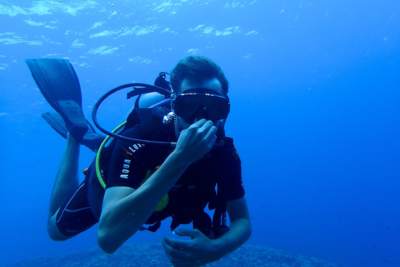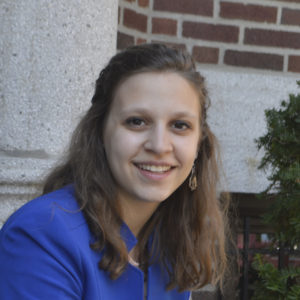There’s an old Jewish joke about a righteous man who kept all the mitzvot. Every day, he prayed to God to win the lottery, and every day, he did not win. After the man died, he entered heaven and found himself at the foot of the Lord. In anger, he asked: “Why did you never cause me to win the lottery?” God simply responded, “You never bought a ticket.”
As Keller sees it, taking action to preserve the ocean is like entering the lottery, a small act that seems insignificant but has the potential for a huge payoff. If no one tries to save the planet – if no one buys a ticket – the planet won’t be saved.
“Even though what we do may be small, every little thing that we do helps to win the lottery – to protect the world and protect the planet,” Keller said. “If everybody bought a ticket, somebody would win.”
Keller’s referring to Scubi Jew’s variety of programs that give students tangible ways to protect Florida’s marine ecosystems. The club participates in coral restoration in Key Largo, reef and waterfront cleanup in Tampa Bay, manatee appreciation in the Crystal River and even shark awareness dives in the Bahamas.
“We’re a Jewish-oriented service diving organization,” Keller said. “You don’t have to be Jewish to join, but the idea is that we use our Jewish values in order to help repair the world.”
Those Jewish values are delivered in the form of Water Torah, a curriculum developed by Rabbi Ed Rosenthal, the founder of Scubi Jew and the Hillel rabbi at Eckerd. Rosenthal, a 19-year Hillel veteran, tried initiating the program at both Emory University and Cornell University to little success. Then, he came to Eckerd.
“When I got to Eckerd, since there were so many marine science students, I tried it again,” Rosenthal said. “I was amazed to find that of the 118 self-identified Jewish students, at least today, 52 of them are certified scuba divers. It’s a crazy percentage.”
The Water Torah curriculum focuses on both kabbala, or Jewish mysticism, and traditional Torah study. For example, Rosenthal draws on part of the second line of Genesis: “And the spirit of God hovered on the water.” Rosenthal said he believes there’s a fundamental mistranslation in the way Jews understand that line. Instead of “hovered,” he says, the Hebrew word is in present tense – “hovers.”
“When we want to talk about where is God in this world, people talk about finding God in the wilderness – yes, you can find God in the wilderness, you can find God everywhere,” Rosenthal said. “But on the most primal level, I believe we find God in water.”
Rosenthal has also personally led and organized Underwater Birthright trips, where participants spend some time touring Israel and scuba diving in the region. Ariele Dashow, a sophomore environmental studies and political science double major, got involved with Scubi Jew after attending one of those trips.
“Not only did I get to explore my heritage and explore my history, but at the same time, I got to scuba dive throughout Israel,” Dashow said. “It was just this really great contrast that, in the end, ended up complementing each other really well. It brought me into the idea of combining Judaism and the sea and just made me fall in love with it.”
Now, Dashow is the dive liaison for Scubi Jew. She attained her scuba diving certification the summer before her junior year of high school after she participated in a volunteer program in the Caribbean. But she said experience isn’t necessary before students join the program, as Scubi Jew subsidizes and organizes dive certifications for its members.
“We do all these amazing trips that then make the world a better place,” Dashow said. “Even if it’s just for one small location or one individual.”
Rosenthal, Keller and Dashow all highlighted the Diveheart program, which gives students the opportunity to spend time diving with individuals with disabilities. Keller said he credits Diveheart instructors with improving his diving skills because of the extra training he received before diving with their program. Now, he doesn’t need as many weights while underwater because he’s improved his buoyancy.
“It was truly amazing to have all these people that needed help putting their wetsuits on, literally could not do anything without the assistance of another human being,” Keller said. “It’s amazing how life-changing it was, because these people get underwater and they start flying around like superheroes.”
Rosenthal said viewing the ocean as a spiritual and holy place makes its desecration even more personal. He’s continually motivated by his mission, especially now that the program has expanded to six other campuses in two states.
“If somebody took a pickaxe to the Kotel or a hammer to the Kotel, they would be attacked,” Rosenthal said. “And it’s a wall. It’s a wall, yet we go into the temple of God for real, where God dwells, and we treat it like a garbage dump.”
Ultimately, he believes Scubi Jew’s mission is to show the Jewish community that they can create change for the planet.
“The whole basis of Scubi Jew is, I believe when the Jewish community gets involved in any issue, substantive change takes place,” Rosenthal said.
Keller said his experience with Scubi Jew has been transformative. Looking past college, he hopes to work as a dive certification instructor and continue his activism.
“The main importance of [Scubi Jew] is the values it instills into people,” Keller said. “I’m a young, Jewish boy coming into college and I have the rabbi telling me, ‘Hey, come use those Jewish values and save the ocean that you love so much.’ I mean, I had to hop right on that train.”
Hannah Bernstein is a New Voices reporting fellow studying journalism and environmental science at Northeastern University.
![diving-1049477_1920 | [Public Domain], via Pixabay](https://newvoices.org/wp-content/uploads/2018/04/diving-1049477_1920.jpg)

